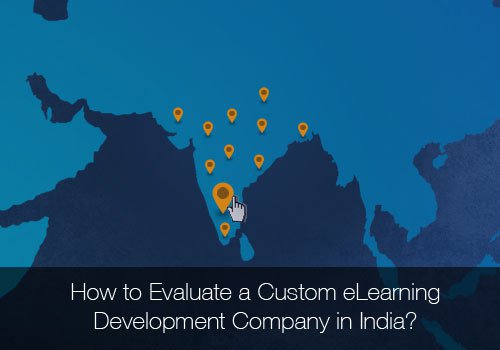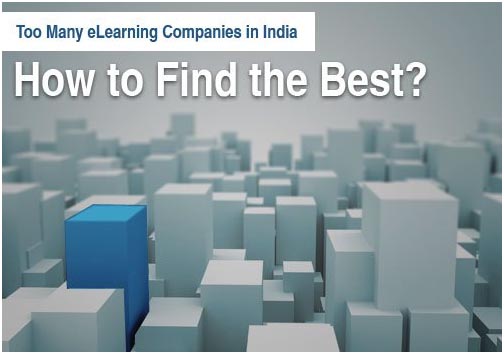
The last few years have seen an influx of outsourcing of eLearning to India. This is clearly reflected in the growth of custom eLearning development companies in India who have a focus on international business. In spite of this, the success stories are not too many. In this article I will share the pointers that I have picked up from the evaluation of my own organization by several global companies when they chose to outsource to India.
Criteria For Evaluating A Custom eLearning Development Company In India
Top 6 criteria for the evaluation (and tips to increase the chances of success) of your outsourcing initiative
- Capability and Expertise in Custom eLearning
This is the start point to look at the services and product portfolio and how closely this maps to your current and future needs.
Tips- Do check for the industry-specific expertise that is relevant for you.
- Do not miss out the review of audited balance sheets to check on the financial stability (more importantly, you must get an understanding of their next 2-3 years’ plan).
- Match your growth plans with the expertise they currently offer/have plans to add in future.
- Do ascertain what they “do not do”!
- Size and capability to scale.
While the current team size should be an important factor for your evaluation, it is equally important to understand how they can scale at a short notice, if required.
Tips- Check on the number of concurrent projects that a typical team handles and the turn-around time.
- Ascertain how easily they can scale to your ad-hoc requirements.
- People (particularly talent in Project Management and Instructional Design).
The quality of people in the vendor team determines the success of your outsourcing initiative. So, ask for the details on the talent that will be potentially aligned for you.- While you start your interaction with the Account Management and Project Management talent first, ask for the details of the next level as well. This information is an important indicator to ascertain how multiple, concurrent projects will be handled.
- Particularly significant is the check on the expertise from the Instructional Design team. It is vital to determine their expertise in learning design. You also need to get clarity on their Instructional Design methodology.
- Then look at Visual Design from the range of talent available (for instance, from visualization to illustration capability). Look at the Technology team’s capability to support varied requirements (different authoring tools, adaptive and response frameworks, and Learning Management System support).
- Last but not least, look at their Quality Management System and specifically check for how they feed the lessons learned to continuously enhance the process.
Tips- If you are targeting outsourcing as a long-term or strategic initiative, start with the management team details first.
- Particularly in the early phase of the association, it is risky to work with the vendor’s contractors. It is essential to have their employees working with you.
- During the evaluation phase, do focus on assessing their working style, communication skills, and flexibility they can offer.
- Development process.
A mature development framework is the second most important factor that would determine the success of your outsourcing initiative. Ask for the detailed work-flow and the supporting assets. Do assess how efficiently the sign-offs will be handled. Ask for the risk management and mitigation measures. Additionally, ask for the communication guidelines and ascertain what measures are in place to ensure timely delivery (with requisite quality).
Tips- Make sure that you check out the flexibility the development framework offers and how easily it can be tweaked and aligned to your development methodology. What is important to check here is the work-flow and if it is aligned to “continuous improvement”.
- You need to also check for actual assets to assess how they are used practically.
- In addition to these, check what their focus is on international business and how it can address the dynamics of distributed development.
- Pricing model for custom eLearning.
One of the benefits of outsourcing is cost saving, so this aspect is a crucial evaluation factor. You must ask for a detailed break-down of all components to ensure that there are no hidden or unplanned costs.
Tips- The project pay-out to the vendor is not the only component of your cost. You need to factor for other aspects, like your Project Management time, tracking for risks, reviews, and tracking how effectively your feedback gets incorporated.
- Quantify all these aspects to determine your Total Cost of Outsourcing (TCO) and assess your progress against this.
- Over a period of time, you should be able to use TCO pointers to leverage more from the same budget and be able to manage more projects at the same time.
- Infrastructure and measures to protect your Intellectual Property (IP).
Since the outsourcing vendor would be your distributed development arm, it is vital to ensure that their infrastructure is in line with your requirements. Additionally, you must ascertain the Info Security policies that they have in place to safeguard your IP.
Tips- While most companies that focus on International business will have the required infrastructure, double check on the bandwidth of communication links.
- Besides obtaining details on Info Security policies, check how exactly the practices to limit access to your information are applied during development.

Aquick summary to use in your evaluation of custom eLearning development companies
- Credentials.
- How long have they been in business of custom eLearning?
- How much has the business grown?
- How many customers are long-term?
- Prior work (demos and samples).
- Ask for a wide range of samples (cutting across varied authoring tools).
- Ask for samples showcasing innovative learning strategies.
- Reference checks.
- Do not depend on email alone to get feedback.
- Pick up the phone and have a detailed discussion – ask for the pain areas, how were challenges addressed, and so on; do not restrict your questions to what worked, ask for what did not work and how they addressed the challenges.
- Work-flow.
- How is it aligned to dynamics of distributed custom eLearning development?
- How easily can it be tweaked to your specific requirements?
- Details of the Management team, Project Managers, and Development team.
- An outline of their HR initiatives to retain talent and what attrition rates they currently have.
- Their take on what they see as the “future of learning” and how they are aligning to it.
I hope this article will add value to your evaluation process and help you in securing a long-term partner who can consistently add value to your business.
Read More:



